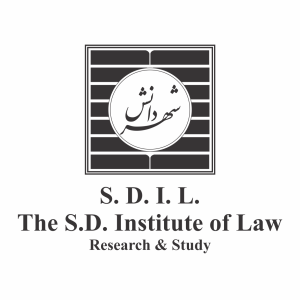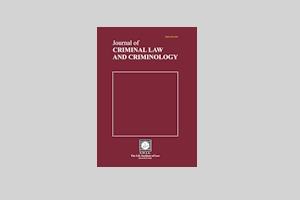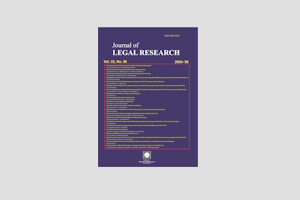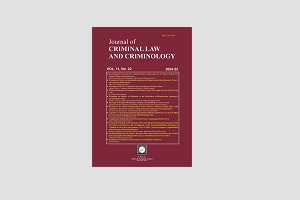Journal of
LEGAL RESEARCH
Number 28
Vol. XIV ● No. 2
Autumn 2015 – Winter 2016
Managing Editor: Vahid Eshtiagh
Editor-in-Chief: Seyyed Ghasem Zamani
CONTENTS
Articles
Independence or lack of independence mosque: Study on draft of “support of management, construction, equipping and renovation of mosques and prayer rooms in the country”
Babak Darvishi- Keyvan Sedaghati
Indigenous and Local Communities under International Wildlife Protection Law
Janet Elizabeth Blake – Fatemeh Rezaipour
A Comparative Analysis of Civil Liability of Caretaker over the Actions of Persons in Need of Care in the Iranian and English Law
Alireza Yazdanian – Elnaz Ghodsi
Legitimacy of Amnesties in International Law
Mahin Sobhani
ISIS’s International Crimes in the light of Criminal Justice
Armin Talaat
Treaties over time in jurisprudence: Evaluation of the Judgment of the International Court of Justice in the Case Concerning the Dispute Regarding Navigational and Related Rights
Farzaneh Seifzadeh
Criteria for Limiting Human Rights and Liberties
Yalda Khosravi
The Role of the Union of South American Nations in the Maintenance of International and Regional Peace and Security
Alireza Ranjbar
Name and trademark: the process of registration and related rights
Eisa Rajabi
La victime en Espagne: acteur privilégié du procès pénal
Mohammad Ali Mahdavi Sabet – Ehsan Abbaszadeh
Articles
Independence or lack of independence mosque:
Study on draft of “support of management, construction, equipping and renovation of mosques and prayer rooms in the country”
Babak Darvishi- Keyvan Sedaghati
Abstract:
After nearly four decades of life of Islamic Republic of Iran, a mosque with a minimum of legal literature and consequently, less control of the government in its administration, are generally governed by the people and has been a pioneer in providing culture and lifestyle. The approach of the draft “support of management, construction, equipping and renovation of mosques and prayer rooms in the country” that have passed the House of representatives dated on 12 April 2015 and were detected inconsistent with the constitution on 5 May 2015 by the Guardian Council, is to weak the position of people and highlighting the role of government in the management of the mosque. In this approach first, so in broad, from construction to management of mosque, the government’s foundation has been explained. Second, qualitative looking on mosque construction is dominant on a qualitative perspective. Third, the integration of competencies and powers of the Endowment as a public institution, the glorious history of the Islamic Republic of Iran to maintain the mosques of the people has been ignored.
Keywords:
Mosque, Endowments and Charity Affairs Organization, Government, people.
Indigenous and Local Communities under International Wildlife Protection Law
Janet Elizabeth Blake
Fatemeh Rezaipour
Abstract:
International era, in the last few decades, has witnessed the emergence of a variety of non-governmental actors such as indigenous and local communities and the gradual emphasis on bottom-up approaches to sustainable development, has proved the necessity for the presence of these actors and has considered empowering them a basic prerequisite in the struggle with global challenges.
The present article aims to determine the extent to which the values and traditional practices of indigenous and local communities are integrated into international policy making and investigate their situation especially in international wildlife protection law.
Keywords:
Indigenous and Local Communities, Traditional Knowledge, Sustainable Development, International Wildlife Protection Law, Human Rights Law, Cultural Heritage Law, Intellectual Property Law.
A Comparative Analysis of Civil Liability of Caretaker over the Actions of Persons in Need of Care in the Iranian and English Law
Alireza Yazdanian
Elnaz Ghodsi
Abstract:
In the law of torts, the utmost compensation for damages suffered by victim had been always considered and in order to achieve this goal some measures and plans had been thought, which one of them is civil liability for the action of another which according to English Law is called vicarious liability. Although according to the principle of personal liability, vicarious liability should be construed as limited and exceptional but nowadays regarding the extent of its instances, there are distinct kinds of this liability which according to the specific rules and principles governing each of them is individually assessed. Civil liability of caretaker over the actions of persons in need of care is one of the types of civil liability arising from the actions of another which in this research studying the conditions and the specific rules of this kind of liability with comparative analysis with English Law is the goal.
Keywords:
English Law, Concurrent Responsibility, Joint Responsibility, the Action of another.
Legitimacy of Amnesties in International Law
Mahin Sobhani
Abstract:
Transition to democracy has always been faced a lot of challenges. One of these challenges is the prosecution and punishment of the prior regime’s officials or reconciliation and granting amnesty in return for transferring power to new government. In addition, the occurrence of internal conflicts and the struggle to end them, call for necessity of granting amnesties in order to encouraging opponents to lay down their arms. In this article, with regard to the ambiguity of international rules as to the legitimacy of amnesty, I seek to examine the legitimacy of granted amnesties in international arena and explain the constraints and prohibitions that international law applies in this respect, through a thorough examination of experience of different countries which, in past, has been in process of transition and examination of existing international rules and documents and way of reaction of international organs to it.
Keywords:
Amnesty, international crimes, Duty to prosecute, Right to a remedy, Right to truth
ISIS’s International Criminal inlight
of Criminal Justice
Armin Talaat
Abstract:
ISIS has committed many crimes in Syria and Iraq. Some of human rights commissions and entities have stated that the terrorist group (ISIS) with inhuman and heinous acts including murder, extermination, slavery, deportation or forcible transfer, torture, grave breaches of the
Geneva Conventions and other rules of international humanitarian law, and destroy all or part of a national, ethnical, racial or religious group, has committed crimes against humanity, war crimes and genocide This crime is a clear example of international crimes. The fight against the perpetrators and instigators of such crimes entails criminal justice, which aims to prosecute and punish the perpetrators. With regard to international crimes committed by ISIS, nationals and international courts are competent to hearing (On the one side, nationals’ court on the basis of universal jurisdiction principle can prosecute and punish the perpetrators, on the other side, under some of conditions, international criminal court could exercise its jurisdiction on the crimes). Hence, this paper firstly describes the crimes committed by ISIS, and then deal with the capacity of the international justice system to combat the terrorist group.
Keywords:
Crimes against Humanity, War Crimes and Genocide, Criminal Justice, Nationals Courts, International Criminal Court.
Treaties over time in jurisprudence:
Evaluation of the Judgment of the International
Court of Justice In the Case Concerning
the Dispute Regarding Navigational
and Related Rights
Farzaneh Seifzadeh
Abstract:
According to the general principle of inter-temporal law in the law of treaties, the terms of a treaty must be interpreted on the basis of their meaning at the time the treaty was concluded and according to the meaning which they possessed. But the contemporaneous meaning of a term will not always be decisive. So, we must also leave room for the consideration of treaties which evolve over time. This paper seeks to answer the question of whether can we make balance between the necessary of the principle of stability in the contractual relations, which is one of the principles of the Law of Treaties , and changes that might occur in a treaty in the future? The general question of “treaties in time” reflects the tension between the requirements of stability and change in the law of treaties. In this context, the evolutionary interpretation is a special techniques to determine the effect of the passage of time on treaties. Also, subsequent agreement and subsequent practice of States parties in the interpretation of a treaty play an effective role.
Keywords:
Treaties over time, Subsequent agreements and subsequent practice of States, The International Court of Justice, The evolutionary interpretation.
Criteria for Limiting Human Rights and Liberties
Yalda Khosravi
Abstract:
Human rights are one of the world’s most important concerns that their limiting must be precise to avoid being vague in appliance. Setting these boundaries are only possible if we clarify the criteria for limiting human rights precisely. In a general look we have two stage of limiting: inner limiting and outer limiting; on stage of inner limiting rights have conflicts with each other and must be compatible with each other, on stage of outer limiting rights have conflicts with things that are known as public interest that would cause limiting of rights. This research is written with the intent to demonstrate that inner limiting is not the only stage of limiting and to give precise criteria for outer limiting.
Keywords:
right, human rights, inner limiting, outer limiting, public interest.
The Role of the Union of South American Nations
in the Maintenance of International and
Regional Peace and Security
Alireza Ranjbar
Abstract:
The Chapter VIII of the United Nations Charter which is devoted exclusively to the regional arrangements is an essential factor in strengthening and expanding the role of regional organizations, especially in the maintenance of peace and security after the creation of the United Nations, In a way that one of the established and common principles of such organizations, as stipulated in the Article 1(1) of the Charter, is to help the United Nations in maintaining international peace and security which is interconnected with regional peace and security. Due to the capacity of regional organizations to maintain international and regional
peace and security, which has been emphasized in the Article 52(3) of the Charter and Security Council’s resolutions, studying the role which could be played by one of the newly created institutions in the Latin America, i.e. the Union of South American Nations, indicates that it has significant influence on the maintenance of international and regional peace andsecurity. This Organization by highlighting confidence and security-building measures, instead of adopting an interventionist approach and coercive measures, seeks to strengthen the positive concept of peace.
Keywords:
Regional organizations, international and regional peace and security, regional agreements and institutions, Chapter VIII of the UN Charter, the Union of South American Nations, UNASUR.
Name and trademark, the process of
registration and related rights
Eisa Rajabi
Abstract:
Intellectual property rights are divided to the two category of industrial and literary and artistic property rights. The category of industrial property rights, which is focused in this article, will support the topics such as patents, marks and trade names, industrial designs, geographical indications and trade secrets. In particular this article discussed about the analysis of both the new and old regulations relating to trademarks and tradenames According to the new regulation on Patents, Industrial designs and Trademarks (approved in 1386) and its differences with the law of Patents (approved in 1310) and Commercial Law (approved in 1311) and its imporatance in trade, it seems necessary thinking at concepts and
terms of new regulation. Before the new regulation, any reference about trademarks and tradenames was just the law of Patent (1310) and the Commercial Code which have shortcomings and ambiguities. Since with the approval of the new regulation, there are different views in this regard. Because of that, In this article, by comparing the articles about trademarks and tradenames with previous Law and commercial law some shortcomings and ambiguities are solved and presented some suggestion for better amendment of new regulation.
Keywords:
industrial property rights, trade marks, collective marks, trade names, register of trade marks and trade names.
La victime en Espagne:
acteur privilégié du procès pénal
Rodolfo Brenes Vargas
Alberto Manuel Poletti Adorno
Mohammad Ali Mahdavi Sabet
Ehsan Abbaszadeh
Abstract:
Before 1995 the term «victim» in the legal literature of Spain did not use and the legislator preferred instead of this idiom scientific celebrity use common words and Common vocabulary among people. The word that under the influence of studies of victim and to pursue reforms happened In 1995 entered into The new Penal Code Spain, now has become common terms in the literature of the country’s criminal law.
Legal texts Spain, by type of crime and how did the victim, have predicted for him a variety of different situations and rights.
Keywords:
Victim, Criminal Procedure, redress, criminal justice system, the vindictive justice.





